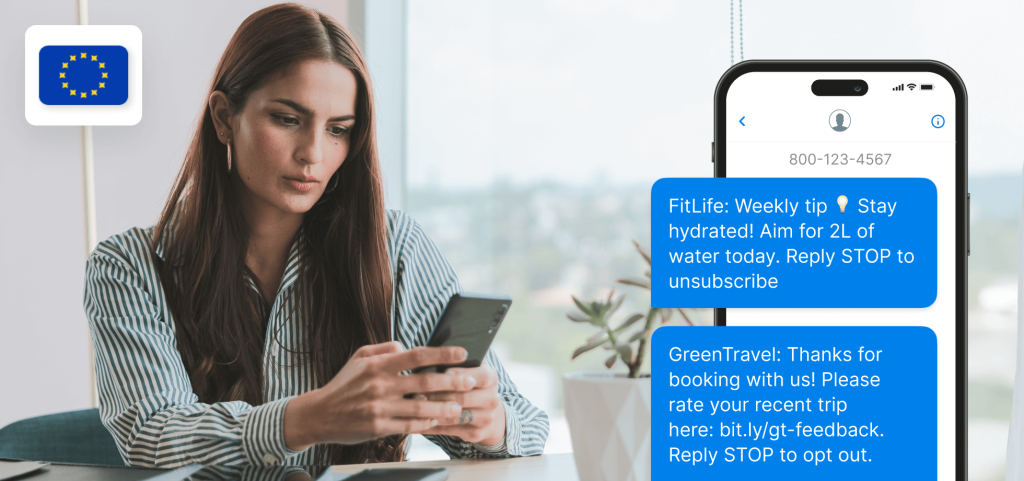
Text messaging has become a core part of how businesses reach customers, but every country enforces its own regulations on SMS marketing. The US (which has text messaging laws by state), the UK, Australia, and the EU Member States each enforce their own text messaging laws that outline how businesses must communicate responsibly. In every region, the core rules are similar: obtain express consent, identify the sender, and allow easy opt-outs.
Without these, sending commercial text messages or promotional text messages may be treated as spam messages, and businesses risk violating text messaging laws with costly penalties.
Understanding these can help you target your SMS marketing strategy accordingly for text messaging laws by state in different parts of the world. Let’s begin.
1. SMS marketing laws in the United States

In the US, the three organizations that deal with text regulations are:
- Cellular Telecommunications Industry Association (CTIA)
- Federal Communications Commission (FCC)
- Mobile Marketing Association (MMA)
While the CTIA and MMA are organizations that encourage best practices for text message marketing, the FCC is a fully-fledged government agency with legislative powers that has enacted several laws, including the Telephone Consumer Protection Act and CAN-SPAM, to regulate SMS marketing, SMS restrictions, and text message privacy laws.
The Telephone Consumer Protection Act (TCPA)
The Telephone Consumer Protection Act (TCPA), enforced by the FCC, remains a cornerstone of text messaging laws in the U.S., requiring prior express written consent before sending marketing texts, even if there’s an existing business relationship.
Consumers must receive “clear and conspicuous” disclosures and agree to texts sent to their specific phone number. Texts must identify the sender, include an opt-out mechanism, and generally be sent between 8 a.m. and 9 p.m. local time, unless a stricter state rule applies.
Violations can cost $500 to $1,500 per message, with private lawsuits available, though It is worth noting that tax-exempt nonprofit organizations are exempt from the TCPA’s opt-in and “do-not-call” requirements.
Recent TCPA updates in 2025:
| Update | Changes |
|---|---|
| Opt-Out Rule (Apr 11, 2025) | Consumers can revoke consent in any reasonable manner; must be honored within 10 business days. Only one non-marketing clarification message is allowed post-revocation. |
| One-to-One Consent Rule | Originally meant to require individualized consent per seller (effective Jan 27, 2025) but was vacated by the Eleventh Circuit before implementation. |
| Supreme Court Ruling | District courts no longer bound by FCC interpretations under Hobbs Act – leading to greater variance in TCPA rulings. |
| AI and Autodialer Risk | AI-driven messaging tools now attract heightened TCPA scrutiny – “autodialer” and “artificial voice” definitions are under legal fire. |
CAN-SPAM Act
Another critical U.S. regulation that intersects with text messaging laws is the Controlling the Assault of Non-Solicited Pornography and Marketing (CAN-SPAM) Act, passed in 2003 and still in force in 2025. Unlike the TCPA, which directly governs SMS marketing, the CAN-SPAM Act primarily regulates commercial email messages. However, it also applies when businesses send email-to-SMS messages (when an email is delivered to a recipient’s mobile phone as a text message).
The CAN-SPAM Act is enforced by the Federal Trade Commission (FTC), with support from the FCC. It works alongside the TCPA to reduce spam, protect consumer privacy, and ensure transparency in mobile and digital marketing practices.
To ensure full CAN-SPAM compliance in 2025, businesses must:
- Clearly identify the message as an advertisement or promotional content
- Include the sender’s valid physical postal address in the message
- Provide a functional opt-out mechanism, such as an unsubscribe link or instructions, that works for at least 30 days after the message is sent
- Honor all opt-out requests within 10 business days
- Use accurate header information, subject lines, and sender identification so the recipient knows exactly who sent the message
US Text messaging laws by state
Being aware of text messaging laws by state is important for any business that uses SMS as a communication or marketing channel. At the federal level, the TCPA and the CAN-SPAM Act establish broad text messaging laws that apply nationwide, requiring prior written consent, clear opt-out instructions, and restrictions on when businesses can send messages. These federal statutes serve as the foundation for compliance and are designed to protect consumers from unwanted or unsolicited text messages.
However, many states have gone further by introducing their own laws for text message marketing. These state-specific rules, sometimes called “mini-TCPA” laws, can impose stricter requirements on quiet hours, increase financial penalties, and expand definitions of what qualifies as a marketing text. Other states rely primarily on federal law but still enforce consumer protection and telemarketing statutes that can apply to SMS.
The table below provides a comprehensive overview of text messaging laws by state, summarizing whether a state has its own SMS regulations, what businesses must do to stay compliant, and the penalties for sending unsolicited text messages. This resource is designed to help marketers, compliance officers, and business owners understand both the federal baseline and the state-level nuances of laws for text message marketing.
| State | Law | Duties | Enforcement |
|---|---|---|---|
| Alabama | No State-Specific SMS Law (follow federal TCPA + state telemarketing rules) | Follow federal TCPA + state telemarketing/Do-Not-Call rules; check state AG guidance. | General telemarketing/DNC statutes |
| Alaska | No State-Specific SMS Law (follow federal TCPA + state telemarketing rules) | Follow federal TCPA + state telemarketing/Do-Not-Call rules; check state AG guidance. | General telemarketing/DNC statutes |
| Arizona | State has its own SMS/Text Marketing Law (explicit rules for texting apply) | Automated texts for solicitation prohibited without consent or EBR; Class 2 misdemeanor. | A.R.S. § 13-2919 (Automated telephone solicitation) |
| Arkansas | No State-Specific SMS Law (follow federal TCPA + state telemarketing rules) | Follow federal TCPA + state telemarketing/Do-Not-Call rules; check state AG guidance. | General telemarketing/DNC statutes |
| California | State has its own SMS/Text Marketing Law (explicit rules for texting apply) | Unsolicited commercial texts generally prohibited absent prior consent or direct relationship. | Cal. Bus. & Prof. Code § 17538.41 |
| Colorado | No State-Specific SMS Law (follow federal TCPA + state telemarketing rules) | Follow federal TCPA + state telemarketing/Do-Not-Call rules; check state AG guidance. | General telemarketing/DNC statutes |
| Connecticut | State has its own SMS/Text Marketing Law (explicit rules for texting apply) | Mini-TCPA: prior express written consent for certain automated calls/texts; time limits. | Conn. Gen. Stat. § 42-288a (and related) |
| Delaware | No State-Specific SMS Law (follow federal TCPA + state telemarketing rules) | Follow federal TCPA + state telemarketing/Do-Not-Call rules; check state AG guidance. | General telemarketing/DNC statutes |
| Florida | State has its own SMS/Text Marketing Law (explicit rules for texting apply) | Florida Telephone Solicitation Act (FTSA): consent, 8am-8pm, 3 attempts/24h, private right. | The 2024 Florida Statutes (including 2025 Special Session C) § 501.059 |
| Georgia | State law may apply to SMS (ambiguous or partial coverage; treat texts as included) | 2024 mini-TCPA update (SB 73) strengthens telemarketing; texts not expressly defined. | O.C.G.A. § 46-5-27 (as amended by SB 73) |
| Hawaii | No State-Specific SMS Law (follow federal TCPA + state telemarketing rules) | Follow federal TCPA + state telemarketing/Do-Not-Call rules; check state AG guidance. | General telemarketing/DNC statutes |
| Idaho | No State-Specific SMS Law (follow federal TCPA + state telemarketing rules) | Follow federal TCPA + state telemarketing/Do-Not-Call rules; check state AG guidance. | General telemarketing/DNC statutes |
| Illinois | State law may apply to SMS (ambiguous or partial coverage; treat texts as included) | Automatic Telephone Dialers Act restricts autodialed/prerecorded calls; may implicate texts. | 815 ILCS 305 |
| Indiana | State has its own SMS/Text Marketing Law (explicit rules for texting apply) | Indiana DNC law expressly includes SMS/MMS as “telephone sales call”. | IC 24-4.7-2 et seq. (HEA 1273) |
| Iowa | No State-Specific SMS Law (follow federal TCPA + state telemarketing rules) | Follow federal TCPA + state telemarketing/Do-Not-Call rules; check state AG guidance. | General telemarketing/DNC statutes |
| Kansas | No State-Specific SMS Law (follow federal TCPA + state telemarketing rules) | Follow federal TCPA + state telemarketing/Do-Not-Call rules; check state AG guidance. | General telemarketing/DNC statutes |
| Kentucky | No State-Specific SMS Law (follow federal TCPA + state telemarketing rules) | Follow federal TCPA + state telemarketing/Do-Not-Call rules; check state AG guidance. | General telemarketing/DNC statutes |
| Louisiana | No State-Specific SMS Law (follow federal TCPA + state telemarketing rules) | Follow federal TCPA + state telemarketing/Do-Not-Call rules; check state AG guidance. | General telemarketing/DNC statutes |
| Maine | No State-Specific SMS Law (follow federal TCPA + state telemarketing rules) | Follow federal TCPA + state telemarketing/Do-Not-Call rules; check state AG guidance. | General telemarketing/DNC statutes |
| Maryland | State has its own SMS/Text Marketing Law (explicit rules for texting apply) | Stop the Spam Calls Act (2023): mini-TCPA with consent & time-of-day limits applying to texts. | Md. Com. Law § 14-4001 et seq. |
| Massachusetts | No State-Specific SMS Law (follow federal TCPA + state telemarketing rules) | Follow federal TCPA + state telemarketing/Do-Not-Call rules; check state AG guidance. | General telemarketing/DNC statutes |
| Michigan | No State-Specific SMS Law (follow federal TCPA + state telemarketing rules) | Follow federal TCPA + state telemarketing/Do-Not-Call rules; check state AG guidance. | General telemarketing/DNC statutes |
| Minnesota | No State-Specific SMS Law (follow federal TCPA + state telemarketing rules) | Follow federal TCPA + state telemarketing/Do-Not-Call rules; check state AG guidance. | General telemarketing/DNC statutes |
| Mississippi | No State-Specific SMS Law (follow federal TCPA + state telemarketing rules) | Follow federal TCPA + state telemarketing/Do-Not-Call rules; check state AG guidance. | General telemarketing/DNC statutes |
| Missouri | No State-Specific SMS Law (follow federal TCPA + state telemarketing rules) | Follow federal TCPA + state telemarketing/Do-Not-Call rules; check state AG guidance. | General telemarketing/DNC statutes |
| Montana | No State-Specific SMS Law (follow federal TCPA + state telemarketing rules) | Follow federal TCPA + state telemarketing/Do-Not-Call rules; check state AG guidance. | General telemarketing/DNC statutes |
| Nebraska | No State-Specific SMS Law (follow federal TCPA + state telemarketing rules) | Follow federal TCPA + state telemarketing/Do-Not-Call rules; check state AG guidance. | General telemarketing/DNC statutes |
| Nevada | No State-Specific SMS Law (follow federal TCPA + state telemarketing rules) | Follow federal TCPA + state telemarketing/Do-Not-Call rules; check state AG guidance. | General telemarketing/DNC statutes |
| New Hampshire | No State-Specific SMS Law (follow federal TCPA + state telemarketing rules) | Follow federal TCPA + state telemarketing/Do-Not-Call rules; check state AG guidance. | General telemarketing/DNC statutes |
| New Jersey | State has its own SMS/Text Marketing Law (explicit rules for texting apply) | Unsolicited advertising by text prohibited without prior express authorization. | N.J. A617 (2014), codified at N.J. Stat. § 2A: Text messaging |
| New Mexico | No State-Specific SMS Law (follow federal TCPA + state telemarketing rules) | Follow federal TCPA + state telemarketing/Do-Not-Call rules; check state AG guidance. | General telemarketing/DNC statutes |
| New York | State has its own SMS/Text Marketing Law (explicit rules for texting apply) | Telemarketing statute expressly includes electronic messaging texts; DNC & disclosure rules. | NY Gen. Bus. Law § 399-z (and § 399-PP) |
| North Carolina | No State-Specific SMS Law (follow federal TCPA + state telemarketing rules) | Follow federal TCPA + state telemarketing/Do-Not-Call rules; check state AG guidance. | General telemarketing/DNC statutes |
| North Dakota | No State-Specific SMS Law (follow federal TCPA + state telemarketing rules) | Follow federal TCPA + state telemarketing/Do-Not-Call rules; check state AG guidance. | General telemarketing/DNC statutes |
| Ohio | No State-Specific SMS Law (follow federal TCPA + state telemarketing rules) | Follow federal TCPA + state telemarketing/Do-Not-Call rules; check state AG guidance. | General telemarketing/DNC statutes |
| Oklahoma | State has its own SMS/Text Marketing Law (explicit rules for texting apply) | Oklahoma Telephone Solicitation Act (OTSA) covers automated texts; written consent needed. | 59 O.S. § 775A.1 et seq. |
| Oregon | No State-Specific SMS Law (follow federal TCPA + state telemarketing rules) | Follow federal TCPA + state telemarketing/Do-Not-Call rules; check state AG guidance. | General telemarketing/DNC statutes |
| Pennsylvania | No State-Specific SMS Law (follow federal TCPA + state telemarketing rules) | Follow federal TCPA + state telemarketing/Do-Not-Call rules; check state AG guidance. | General telemarketing/DNC statutes |
| Rhode Island | No State-Specific SMS Law (follow federal TCPA + state telemarketing rules) | Follow federal TCPA + state telemarketing/Do-Not-Call rules; check state AG guidance. | General telemarketing/DNC statutes |
| South Carolina | State has its own SMS/Text Marketing Law (explicit rules for texting apply) | Definition of “telephone solicitation” includes texts/media messages to SC residents. | S.C. Code Ann. § 37-21-20 et seq. |
| South Dakota | No State-Specific SMS Law (follow federal TCPA + state telemarketing rules) | Follow federal TCPA + state telemarketing/Do-Not-Call rules; check state AG guidance. | General telemarketing/DNC statutes |
| Tennessee | No State-Specific SMS Law (follow federal TCPA + state telemarketing rules) | Follow federal TCPA + state telemarketing/Do-Not-Call rules; check state AG guidance. | General telemarketing/DNC statutes |
| Texas | State has its own SMS/Text Marketing Law (takes effect on Sept 1, 2025) | 2025 amendments expand state telemarketing law; adds consent, opt-out rules including texts. | Tex. Bus. & Com. Code § 305 (as amended by 2025 bills) |
| Utah | State has its own SMS/Text Marketing Law (explicit rules for texting apply) | Mini-TCPA with consent/time limits; covers calls and electronic messages. | Utah Code Ann. § 13-25a-101 et seq. |
| Vermont | No State-Specific SMS Law (follow federal TCPA + state telemarketing rules) | Follow federal TCPA + state telemarketing/Do-Not-Call rules; check state AG guidance. | General telemarketing/DNC statutes |
| Virginia | State has its own SMS/Text Marketing Law (explicit rules for texting apply) | Virginia Telephone Privacy Protection Act (VTTPA) applies to calls and texts; opt-out by reply. | Va. Code Ann. § 59.1-514 et seq. |
| Washington | State has its own SMS/Text Marketing Law (explicit rules for texting apply) | Commercial texts unlawful without consent; private right of action under CEMA. | RCW 19.190.060 |
| West Virginia | No State-Specific SMS Law (follow federal TCPA + state telemarketing rules) | Follow federal TCPA + state telemarketing/Do-Not-Call rules; check state AG guidance. | General telemarketing/DNC statutes |
| Wisconsin | State has its own SMS/Text Marketing Law (explicit rules for texting apply) | State DNC law covers unsolicited text sales pitches; DATCP guidance confirms. | Wis. Stat. § 100.52; Wis. Admin. Code ATCP 127 |
| Wyoming | No State-Specific SMS Law (follow federal TCPA + state telemarketing rules) | Follow federal TCPA + state telemarketing/Do-Not-Call rules; check state AG guidance. | General telemarketing/DNC statutes |
| District of Columbia | No State-Specific SMS Law (follow federal TCPA + state telemarketing rules) | Follow federal TCPA + state telemarketing/Do-Not-Call rules; check state AG guidance. | General telemarketing/DNC statutes |
2. SMS marketing laws in Canada

In Canada, SMS for marketing requires to follow strict texting laws for business aimed at protecting personal information, securing consent, and giving consumers control over how they receive and manage messages.
Canada’s Anti-Spam Legislation (CASL)
The key framework is Canada’s Anti-Spam Legislation (CASL), which came into effect in July 2014 and remains one of the strictest anti-spam regimes in the world. CASL applies to all commercial electronic messages (CEMs), including SMS and MMS marketing.
Alongside CASL, the Personal Information Protection and Electronic Documents Act (PIPEDA) governs how businesses collect, use, and disclose personal information in commercial activities, ensuring SMS campaigns align with data protection standards. Additionally, the Canadian Short Code Compliance Policies apply to businesses using short code numbers, requiring express user consent, opt-out mechanisms, accurate sender identification, cost disclosures, and a prohibition on unlawful or deceptive content.
Together, these frameworks form a unified national approach to SMS compliance, making Canada one of the most regulated environments for text marketing.
Here are the essentials for 2025 compliance under CASL:
- Initial opt-in required: Businesses must obtain express consent before sending promotional text messages. Implied consent is allowed only in specific cases, such as existing customer relationships, but it expires after a set period.
- Sender identification: All text messages must clearly identify the business sending them.
- Clear opt-out methods: Every SMS must include a simple and accessible way for recipients to unsubscribe (reply STOP).
- Penalties for violations: Fines can reach up to $10 million per violation for businesses that send unsolicited messages or fail to comply with CASL’s transparency requirements.
So while Canada doesn’t have text messaging laws by state/province, the federal CASL law sets a unified national standard that all businesses must follow, no matter where in the country customers are located.
| Province/Territory | Compliance requirements | Relevant Law/Regulation |
|---|---|---|
| Alberta | Follow CASL, PIPEDA, and Canadian Short Code Compliance; obtain express consent and provide opt-outs. | CASL (S.C. 2010, c. 23); PIPEDA; Canadian Short Code Compliance Policies |
| British Columbia | Consent before sending; honor unsubscribe within 10 days; accurate sender ID; disclose any message costs. | CASL; PIPEDA; Canadian Short Code Compliance Policies |
| Manitoba | Comply with CASL; no sending unsolicited messages without consent; include functional opt-out. | CASL; PIPEDA; Canadian Short Code Compliance Policies |
| New Brunswick | Obtain initial opt-in and provide clear opt-out methods; identify the sender in each SMS. | CASL; PIPEDA; Canadian Short Code Compliance Policies |
| Newfoundland & Labrador | SMS must qualify as a lawful commercial electronic message and include an unsubscribe mechanism. | CASL; PIPEDA; Canadian Short Code Compliance Policies |
| Nova Scotia | Explicit permission required; sender identification and easy unsubscribe in every message. | CASL; PIPEDA; Canadian Short Code Compliance Policies |
| Ontario | CASL covers commercial text messages; honor opt-out requests within 10 business days. | CASL; PIPEDA; Canadian Short Code Compliance Policies |
| Prince Edward Island | No sending unsolicited ads without consent; include sender info and opt-out instructions. | CASL; PIPEDA; Canadian Short Code Compliance Policies |
| Quebec | Follow CASL for SMS marketing; also align with Quebec’s enhanced privacy requirements. | CASL; PIPEDA; Quebec Privacy Act (Law 25); Canadian Short Code Compliance Policies |
| Saskatchewan | Secure consent before treating text messages as part of your marketing strategy; provide opt-out. | CASL; PIPEDA; Canadian Short Code Compliance Policies |
| Northwest Territories | Express consent, clear sender ID, and a functional unsubscribe are required. | CASL; PIPEDA; Canadian Short Code Compliance Policies |
| Nunavut | Compliance with CASL; unlawful to send messages without prior consent. | CASL; PIPEDA; Canadian Short Code Compliance Policies |
| Yukon | Uniform CASL rules apply: consent, opt-out, and sender transparency. | CASL; PIPEDA; Canadian Short Code Compliance Policies |
To explore this topic in more detail, we recommend reading our in-depth article on Canada SMS marketing.
3. SMS marketing laws in Australia

In 2025, compliance means treating SMS as a regulated channel: secure consent through an initial opt in, build trust with your audience, and integrate clear opt out methods into every campaign to ensure your marketing strategy is both effective and lawful.
Spam Act
Australia regulates SMS under the Spam Act, most recently updated in 2016, with additional requirements introduced through the Spam Regulations 2021, which came into effect on April 1, 2021. Together, these laws make sending unsolicited messages and sending unsolicited ads illegal. Businesses must obtain explicit permission through an initial opt in before they can treat text messages as a valid marketing channel.
Unlike the U.S. TCPA, an existing relationship with a customer may be enough to demonstrate consent under the Spam Act. However, any text that forms part of your marketing strategy must still clearly identify your business and include clear opt out methods so recipients can easily stop future communications.
Another distinction in Australia is that if you purchase a contact list from another organization, and those contacts have consented to receive messages from third parties, you can legally use that list for your own marketing. That said, if you are sending unsolicited ads without proper consent or failing to provide transparent opt-out instructions, you risk penalties from the Australian Communications and Media Authority (ACMA).
Since many businesses operate regionally, it’s helpful to see compliance obligations listed state by state. The table below shows how the national laws apply uniformly across all Australian states and territories, ensuring that marketers understand their responsibilities no matter where their customers are located.
Australia text messaging laws by state
| State/Territory | Compliance requirements |
|---|---|
| New South Wales (NSW) | Follows Spam Act 2003 & Spam Regulations 2021: explicit consent, clear sender ID, unsubscribe option, comply with ACMA enforcement including the upcoming SMS sender ID register. |
| Victoria (VIC) | Same as above. Adherence to federal requirements is mandatory. |
| Queensland (QLD) | Same as above. SMS marketing must meet consent, ID, opt-out, and compliance rules. |
| South Australia (SA) | Same as above. |
| Western Australia (WA) | Same as above. |
| Tasmania (TAS) | Same as above. |
| Australian Capital Territory (ACT) | Same as above. |
| Northern Territory (NT) | Same as above. |
If you’d like to explore this topic in more detail, including penalties for non-compliance and best practices for staying compliant, make sure you check out our article on Australia SMS marketing compliance for businesses.
4. SMS marketing laws in the UK

Businesses sending SMS in the UK must comply with texting laws designed to protect consumers from misuse of their personal data.
Privacy and Electronic Communications Regulations (PECR)
The UK’s Privacy and Electronic Communications Regulations (PECR) set the rules for sending marketing by “electronic mail”, which includes SMS. In most cases you need specific consent to text individuals, you must identify your organisation, and every message must include a working way to unsubscribe (eg, Text STOP). PECR operates alongside Data Protection Act 2018 (for lawful processing, transparency and accountability).
It’s also worth noting that the UK Sender ID Regulations, introduced in September 2023, initially banned three specific words – Alert, Info, and Verify – from being used as Sender IDs. As of October 31st, 2023, the prohibited list expanded to include 121 words in total, further tightening restrictions on how businesses can present themselves in SMS campaigns.
Similar to Australia, the UK allows a limited “soft opt-in” for existing customers: you can text them about your own similar products/services if you obtained their details during a sale/negotiation, gave a clear opt-out at collection, and include an opt-out in every message. The Information Commissioner’s Office (ICO) provides detailed guidance under Regulation 22(2).
The ICO notes its direct-marketing guidance is being updated following the Data (Use and Access) Act 2025. One change adds a soft-opt-in route for charities (for messages furthering charitable purposes) where strict conditions are met. At the same time, the ICO enforces PECR and can fine organisations for unlawful texts. Consumers can also forward scam/unwanted texts to 7726 (free) so networks can block senders.
UK Text messaging laws by state
While the United Kingdom does not have separate text messaging laws by state in the way the United States does, all four UK countries – England, Scotland, Wales, and Northern Ireland, are governed by the same national framework, as follows:
| Country | Governing law for SMS marketing | Key duties for compliance | Enforcement / reporting |
|---|---|---|---|
| England | PECR + UK GDPR/DPA 2018 | Consent for texts (or soft opt-in where all conditions met); identify sender; include easy unsubscribe in every SMS; keep records. | ICO enforces; report scam texts via 7726. |
| Scotland | PECR + UK GDPR/DPA 2018 | Same as England. | ICO; report via 7726 (Police Scotland for fraud via 101). |
| Wales | PECR + UK GDPR/DPA 2018 | Same as England. | ICO; report via 7726. |
| Northern Ireland | PECR + UK GDPR/DPA 2018 | Same as England. | ICO; report via 7726. |
For extra details and compliance best practices, feel free to check out our full article on Texting in the UK.
5. Text message laws in the EU

The whole principle behind stricter privacy regulations for the EU involves ensuring customers benefit from improved business experiences and higher transparency regarding how their data is being used.
ePrivacy Directive
The ePrivacy Directive (2002/58/EC, amended 2009) remains the EU’s core law for electronic communications, covering text messages alongside email and telemarketing. The long-anticipated ePrivacy Regulation (intended to replace the Directive with a uniform EU law) was formally withdrawn in 2025, so the Directive remains in force until further reform.
- Consent first: Businesses must obtain explicit opt-in before sending commercial or promotional text messages.
- Soft opt-in: Some member states allow limited exceptions (similar to Australia’s and the UK’s “soft opt-in”), where previous customer relationships exist and unsubscribe options were provided at data collection.
- Transparency: Every SMS must identify the sender and provide a clear opt-out method.
- Unsolicited messages: Sending unsolicited messages without consent remains prohibited, with fines imposed at the member state level.
General Data Protection Regulation (GDPR)
The GDPR works alongside ePrivacy by regulating the use of personal data for marketing, including SMS. While ePrivacy specifies how to send messages, GDPR sets the standards for handling customer information. Under the European Data Protection Board’s 2025 guidance, GDPR record-keeping requirements have been simplified, but cross-border enforcement has been strengthened.
- Legal basis: For SMS marketing, the most appropriate basis is usually consent. Rarely, a legitimate interest argument may apply, but only if carefully documented and balanced against individuals’ rights.
- Consent standards: Consent must be freely given, specific, informed, and unambiguous (eg, a tick box at signup). Pre-ticked boxes or bundled consent are invalid.
- Transparency duties: Businesses must clearly explain how phone numbers will be used for SMS in privacy policies.
- Opt-out rights: Article 21 GDPR gives individuals the right to object to direct marketing at any time, which must be respected immediately.
Ensure SMS compliance with Textmagic
Text messaging laws are designed to protect consumers from unsolicited messages while ensuring businesses stay transparent and respectful. Non-compliance can lead to costly penalties and reputational harm, but with the right approach, your SMS marketing strategy can drive engagement and sales responsibly.
Start sending compliant text messages
Sign up for a free Textmagic trial today and send global SMS campaigns with confidence.

With Textmagic, you can easily manage consent, include clear opt-out methods, and send messages that comply with global texting laws for business. Our platform makes it simple to run effective, compliant SMS campaigns that build trust and deliver results.
Key takeaways on text messaging laws
Wherever you run SMS campaigns, compliance with text messaging laws by state and national frameworks like PECR or the Spam Act is essential for trust and deliverability. Most require initial opt in and explicit permission before you treat text messages as part of your marketing strategy.
Key points to follow:
- Always identify your business in each SMS
- Provide clear opt out methods
- Check numbers against the do not call registry
- Respect local quiet hours
- Send only relevant promotions or timely appointment reminders
By documenting consent and honoring unsubscribes, you align with global texting laws while protecting consumer rights and keeping SMS a reliable marketing channel.
This article contains general information about main messaging laws and regulations and does not constitute legal advice. Please seek professional counsel for in-depth information regarding current text messaging laws and to avoid possible SMS legal complaints.
Frequently Asked Questions (FAQs)
A text message can be legally binding if it clearly outlines an agreement between parties and shows mutual intent, offer, and acceptance. If this is the case, it can be considered legally enforceable in court.
All U.S. states are subject to the federal TCPA rules.
This means that regardless of where your business or customers are located, you need written consent to text clients for marketing purposes. Some states might supplement these rules with additional requirements, but they do not replace the TCPA’s authority.
Yes. Under the Spam Act 2003 and Spam Regulations 2021, businesses cannot send unsolicited commercial electronic messages, including SMS. You must obtain explicit permission or rely on a valid existing relationship before sending texts, and every message must include clear opt out methods.
No. Under PECR and the UK GDPR, businesses cannot send promotional text messages to contacts from purchased lists without valid consent.
Consent must be freely given, specific, and informed, and the individual must have agreed to receive SMS marketing from your business directly. Using third-party data without this consent may be treated as sending unsolicited messages and can result in enforcement action by the ICO.
In the EU, SMS marketing falls under the ePrivacy Directive alongside the GDPR. This requires businesses to secure unambiguous consent before sending messages, treat text messages like any other personal data processing, and protect subscriber privacy.
Consumers must be able to withdraw consent at any time, and fines for non-compliance can be severe under GDPR.
From a legal standpoint, spam is defined by a lack of consent.
Whether it’s one or 50 texts, if the recipient didn’t explicitly agree to receive them, they’re considered spam and illegal under SMS marketing laws.
No. The CAN-SPAM Act requires that commercial electronic messages must meet strict compliance standards, even if the recipient already has an existing relationship with the sender. The law is content-focused rather than consent-focused; unlike TCPA, it doesn’t require prior written consent, but it does require clear disclosures and opt-out functionality.
Related articles
Top 10 self-service help desks to elevate your customer support
Nowadays, with just a few taps on our smartphones, w...
How to use concept maps to organize complex ideas (plus free templates)
From marketing strategies to customer service workfl...
Are you tracking the right email KPIs? A reality check for small businesses
Small business owners and marketers wear multiple ha...
Business goals examples: What they are and how to set them right
Are you setting realistic business goals that push y...
Top 10 benefits of online texting services you haven’t considered
Texting is the pinnacle of convenience for instant c...




